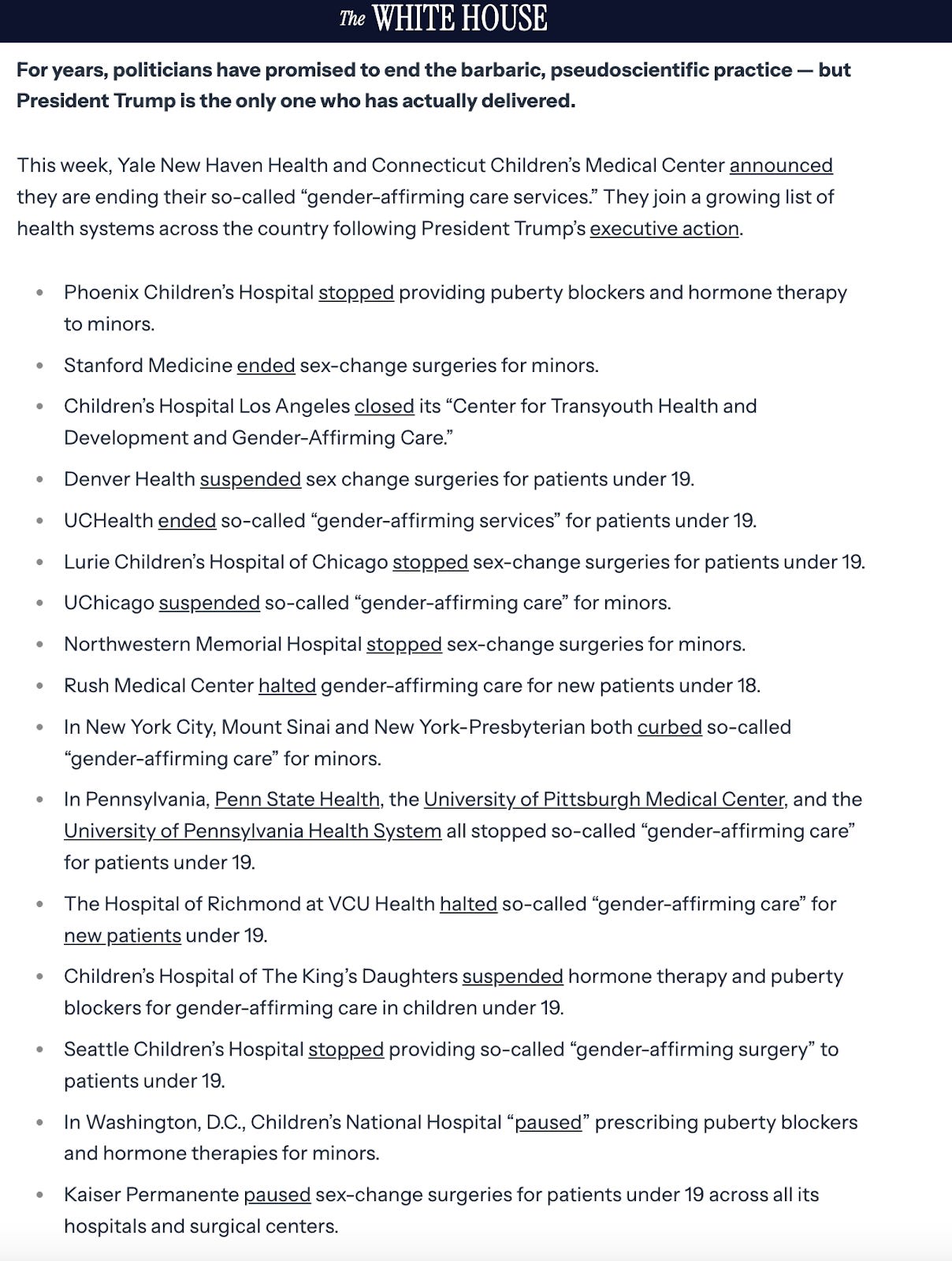Devastating Blows to Trans Care at Kaiser, Yale & Others
Kaiser represents the latest battlefront in a wave of health systems either pressing pause or closing their doors on trans-affirming care for youth.
Earlier this week, Arne Johnson, a Bay Area parent and advocate with the Rainbow Families Action, was one of 750 caregivers of trans youth who signed a letter sent to Kaiser Permanente leadership, lauding them for providing exceptional care to his trans teen.
“Despite the claims of a misguided and brazen disinformation movement, Kaiser Permanente has demonstrated that it has the best outcomes for trans and gender expansive youth at heart, and is providing important, effective, and scientifically proven care to its patients,” the letter reads.
The very next day, the Kaiser system, which serves hundreds of thousands of patients through 700 hospitals and medical offices in eight states, announced it was “pausing” gender-affirming surgical procedures for trans people under 19 years of age. Rumors are swirling that hormone therapies and puberty blockers are next, as well as insurance coverage for GAC from state insurance plans.
Now, Johnson must wonder what comes next for his family. With the trans care bans, in law and in practice, targeting even legal adults, many fear it's only a matter of time before the anti-trans witch hunt catches up to them. Kaiser represents the latest battlefront in a wave of health systems either pressing pause or closing their doors on trans-affirming care for youth. Notably, many such treatments, such as puberty blockers, remain readily available for cisgender children.
“The situation that we are facing is going to be faced by everybody at some point,” Johnson told Erin in the Morning. “I think it can seem tiny, but it feels to me like a real erosion—one of the many erosions that we're facing at all times, of course. This feels to me like the beginning of something, not just the end.”
Upon Donald Trump’s return to office, he dubbed gender-affirming care “mutilation” via an executive order and called for its prohibition under age 19, which is the legal cutoff for someone to be considered a minor under Medicaid. Some lawmakers have gone above and beyond this metric. In Puerto Rico, for example, trans-affirming medical care has been banned until age 21.
Kaiser’s capitulation comes amid a wave of attacks on health care. The Trump administration reportedly subpoenaed 20 hospitals and/or clinicians over their supposed provision of legal and evidence-based gender-affirming care. He accused them of violating federal female genital mutilation prevention laws, which consists of narrowly-tailored statutes not applicable to gender-affirming procedures, and/or of violating his executive order, even though executive orders do not hold the weight of law. And many state laws, including California, enshrine protections for trans-affirming care at all ages.
But Kaiser is not the only health care system this week to falter. The same day as their announcement, Yale Medicine announced the withdrawal of gender-affirming “medication,” likely including both hormone replacement therapy and puberty blockers for trans youth under age 19. And at Connecticut Children’s, all care for trans patients under 19 will be “winding down.”
On Friday, Trump subsequently released a statement taking a victory lap over the nearly 20 hospitals and health care systems that evidently restricted trans-affirming care in response to his executive order.
Many clinics are still offering psychotherapy. But as experts have reiterated time and time again, talk therapy cannot “cure” transness or gender dysphoria.
For many parents of trans youth, and trans people themselves, this repression is not surprising. “l actually predicted that when [Trump] came into power, this was going to happen,” said Jay, a parent of a trans teen who has been receiving hormone treatment from Yale. He spoke on the condition of anonymity due to the risk of state persecution.
"We've been preparing for that, creating a plan B, a plan C, a plan D, for everything,” he told Erin in the Morning.
Several times a year, Jay and his teenager have been flying from a deeply conservative state and staying at a hotel in Connecticut to access gender-affirming care, paying for everything, including treatment, out-of-pocket. Now that their Connecticut options have dried up, Jay is planning to take his child to another state, or perhaps out of the country, for their appointments.
In response to queries from Erin in the Morning, spokespersons for Kaiser, Yale and Connecticut Children’s Hospital directed inquiries about the changes in care to pre-existing public statements.
Jay said he is privileged to pivot to find care for his child. But not everyone has the means to board a plane or pay medical fees in full for health care.
The anti-trans decision of Skrmetti has cast a dark shadow over the future of trans rights on the federal level. Still, avenues of legal remedy remain. State attorneys general could enforce equal protection laws that bar these kinds of trans-exclusionary care stoppages. They could also pool resources and take on the federal government in court; in January, Tong and 22 other state attorneys general, including Rob Bonta of California, filed a lawsuit in a district court to halt the Trump Administration’s unlawful efforts to freeze federal funds over gender-affirming care. However, it’s not immediately clear what the outcome will be given the Trump Administration’s far-right court-packing.
A spokesperson for Connecticut Attorney General William Tong told Erin in the Morning that his office “is evaluating all legal options to protect Connecticut families and healthcare providers.” On Thursday, July 24, Bonta seemed to signal at a press conference that he would be taking more direct action in the coming weeks.
Trump is “attempting to bully these hospitals into submission, to stop providing gender affirming care, waging the culture wars fuel of cruelty and hate, in contradiction of California law which does require the provision of gender affirming care,” Bonta said at a Thursday press conference. “We want to focus on the problem, which is the threat emanating from Washington D.C. and the Trump Administration, and we will be.”
In the meantime, trans patients are applying pressure on lawmakers and health systems to hold the line on trans-affirming care. On Friday, Rainbow Families Action was one of many organizations to rally outside a Kaiser San Francisco center to demand the reinstatement of care and push the health care system to resist further legal encroachment.
“Kaiser was thought to be this safe haven. People who had lost care elsewhere were specifically moving their children to them to have continuity of care,” said Calder Storm, a parent of trans kids. He sought out Kaiser precisely because it does not rely on federal grants and research funds in the way that other state institutions, like Children’s Hospital Los Angeles and Stanford University hospitals, do, making them more vulnerable to political pressure from the Trump Administration.
“They should not be leveraging the healthcare of children, like the actual health care of actual children, into their politics,” Storm told Erin in the Morning. “That's essentially what they're doing here by making these demands of providers and scaring hospitals and institutions into compliance.”
At the same time, many providers have joined the fight and condemned the attacks on their patients. The largest nurses’ union in the country condemned Kaiser Permanente for gender-affirming care rollbacks.
“No one should have to fear coming to a hospital,” said Sydney Simpson, a Kaiser nurse in San Francisco, and spokesperson for the union. “But when corporations pre-emptively comply with these restrictions, they enable and empower political attacks on health care for vulnerable populations.”





Bullying hospitals into hurting some of their patients by forcing them to choose between harming some of their patients or losing funding for all of their patients to circumvent having to actually pass legislation shouldn't be possible; the president shouldn't have unilateral power to overrule medical science. Trans people are not going back, we're just going to get louder.
I think we need our own dedicated treatment centers, serving only trans people, which don't expect or rely on grants or remuneration from any government. They would have to be willing to forego Medicaid and Medicare payments - to go fully out of pocket if necessary. We need centers, if only a few of them, that can provide all types of care, from GA counseling, through plastic and reconstructive surgery - centers protected by deep-blue-state laws that will never close their doors. Care for trans people should, at the very minimum, be one domestic flight or train ride away.